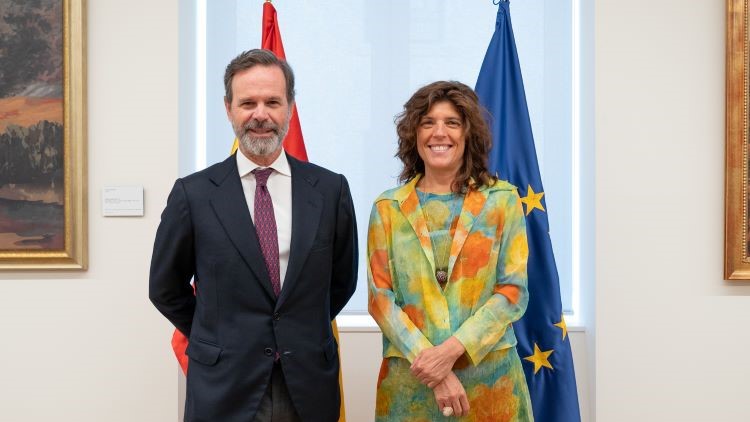The Diplomat
The Caja de las Letras of the Instituto Cervantes received last Monday the legacy in memoriam of the writer Max Aub, one of the main figures of Spanish literature in exile, from the hands of the president of the Max Aub Foundation and granddaughter of the author, Teresa Álvarez.
During the ceremony, the director of the Instituto Cervantes, Luis García Montero, highlighted Max Aub’s “awareness of history and human dignity” and reviewed the difficult times he had to live through (World War I, Spanish Civil War, World War II, the concentration camps and the years of exile in Mexico). According to García Montero, “for Aub, the important thing was not to win or to be defeated, to be or to be exiled, the important thing was to bear witness to the human dignity with which any chance must be faced”.
For her part, the writer Marta Sanz, who acted as a witness of honor, regretted that “the Transition was not entirely fair with Max Aub”. “We are still in time to repair these injustices and place him in the great place he deserves in the history of Spanish literature,” she added.
Aub’s legacy in the Caja de las Letras includes three facsimiles published by the Max Aub Foundation, donated in perpetuity to the Patrimonial Library of the Cervantes Institute; the first editions of the magazines Crímenes ejemplares (1957) and Sala de espera (1960), the publication El Correo de Euclides with which Aub used to send Christmas greetings, and the palette that Max Aub used to paint the Campalans, drawings and paintings supposedly created by the cubist painter Jusep Torres Campalans, who in reality was a character invented by the writer, the protagonist of one of his most widely translated works, Jusep Torres Campalans (1958).
In addition, the Instituto Cervantes has added to the legacy the first editions of the books Diario de Djelfa (1944), Cuentos ciertos (1955), La verdadera historia de la muerte de Francisco Franco (1969) and Campo de sangre (1945), third volume of his series on the Spanish Civil War, El laberinto mágico. With the deposit of this legacy closes the year of commemorations, which began in July 2022, for the 50th anniversary of the death of Max Aub and the 25th anniversary of the establishment of the Max Aub Foundation, an entity recognized with the Gold Medal for Merit in Fine Arts in December 2021.
The Spanish novelist, playwright, poet and critic Max Aub Mohrenwitz was born in Paris in 1903 to a Franco-German family and died in Mexico City in 1972. As a child, his family moved to Spain and in the 1920s he began to write experimental theater. Concerned from his youth about the social and political reality of Spain, he committed himself to the Republic and collaborated with the French writer André Malraux in the Civil War film Sierra de Teruel (1945).
In 1942 he arrived in Mexico as an exile, after passing through concentration camps in France and Algeria. There he earned his living in journalism and film as an author, co-author, director and translator of screenplays. In exile he wrote the best of his work: the six novels and the numerous stories that make up El laberinto mágico, two other great novels with a Spanish theme (Las buenas intenciones and La calle de Valverde) and his most translated work, Jusep Torres Campalans, a biography of the character invented by the writer whose letters/drawings have been delivered in the legacy. Censorship did not allow anything to be published in Spain until the 1960s.







